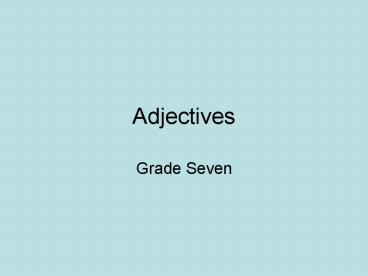Adjectives - PowerPoint PPT Presentation
1 / 22
Title:
Adjectives
Description:
Adjectives Grade Seven * * * * * * * * * * * * What are Adjectives? Adjectives are modifiers. They modify nouns or pronouns. This means they change the image of a ... – PowerPoint PPT presentation
Number of Views:117
Avg rating:3.0/5.0
Title: Adjectives
1
Adjectives
- Grade Seven
2
What are Adjectives?
- Adjectives are modifiers. They modify nouns or
pronouns. This means they change the image of a
noun or pronoun. - Adjectives can be located by asking the
questions - What kind?
- Which one?
- How many?
- How much?
3
What are Adjectives?
- Picture a car in your mind.
- Do you have an
- image in your head?
- Now make it red.
4
What is an Adjective?
- Now make it fast.
5
What is an Adjective?
- Now make it old-fashioned.
6
What is an Adjective?
- Now make it broken.
7
What is an Adjective?
- Now make it green.
8
What is an Adjective?
- Adjectives change the meaning of a noun
- by somehow changing the image of it.
- Thats why they are called modifiers.
- There are two kinds of adjectives
- descriptive
- and
- limiting.
9
Descriptive Adjectives
- Descriptive adjectives
- DESCRIBE!
- The add some sensory image to your sentence which
allows the reader to see, smell, hear, touch, or
taste something in the sentence. - All of the modifiers in the earlier section of
the slide show concerning the car were
descriptive adjectives. They made the car red,
fast, old-fashioned, broken, and green. Those
words are all adjectives! - Descriptive adjectives make writing much better!
10
Proper Adjectives
- One type of descriptive adjective is called the
proper adjective. - Proper adjectives are derived from, or come from,
proper nouns. This means that they must always
be capitalized. - Proper adjectives sometimes are formed by adding
a suffix to the proper noun.
11
Proper Adjectives
- Examples of Proper Adjectives
- Proper Noun Proper Adjective
- America American
- France French
- China Chinese
- Pennsylvania Pennsylvanian
12
Proper Adjectives
- Sometime proper nouns dont change in form at all
when they become proper adjectives. - Ex. President Kennedy was a good leader. (In
this sentence President Kennedy is a person
therefore, he is a noun.) - Ex. The Kennedy Library is very large. (in this
sentence Kennedy is describing the library
therefore, it is an adjective.)
13
Limiting Adjectives
- Limiting adjectives point out nouns.
- There are five kinds of them
- Articles
- Possessives
- Demonstratives
- Indefinites
- Interrogatives
14
Articles
- There are three articles
- a
- an
- the
- The is called a definite article because it
points out nouns more specifically. - A and an are called indefinite articles
because they do not point nouns out as
specifically.
15
Articles
- The can be used before both singular and plural
nouns. - Ex. the cat, the houses
- A and an can only be used before singular
nouns. - Ex. a book, an elephant
16
Articles
- The can be used before both vowels and
consonants. - Ex. the ant, the car
- A must be used before consonant sounds.
- Ex. a duck, a fossil, a uniform
- An must be used before a vowel sounds.
- Ex. an umbrella, an excuse
17
Possessive Adjectives
- Possessive adjectives show ownership of a noun.
- These words are the same as the possessive
pronouns. - There are fourteen possessive adjectives
- my, mine our, ours
- your, yours your, yours
- his, her, hers, its their, theirs
18
Demonstrative Adjectives
- Demonstrative adjectives point out a noun.
- They are the same words as the demonstrative
pronouns. - There are four demonstratives
- this
- that
- these
- those
19
Indefinite Adjectives
- Indefinite adjectives point out nouns.
- They often tell how many or how much of
something. - There are seventeen of them
- all, any, another, both, each, either, few,
little, many, more, most, much, neither, one,
other, several, some
20
Interrogative Adjectives
- Interrogative adjectives are used to ask
questions. - Three of them were also interrogative pronouns
- which
- what
- whose
21
Limiting Adjectives
- Many limiting adjectives have also been studied
as pronouns. How do you tell when they are
pronouns and when they are adjectives? - -If a word is a pronoun, it will be renaming
a person, place, or thing. - Ex. That is a pencil. (That is renaming the
pencil therefore, it is a pronoun.) - -If a word is an adjective, it will be pointing
out a noun. - Ex. That pencil is big. (That is pointing out
a pencil, and pencil is a noun therefore, it is
an adjective.)
22
Location of Adjectives
- Adjectives can be located in three places in a
sentence. - The most common location is directly in front of
the noun it is modifying. - Ex. the big dog, the new toy
- Another location is after a linking verb or verb
of condition. These are called predicate
adjectives. - Ex. The game was interesting.
- 3. The final location of adjectives occurs after
a noun when it is set off by commas. - Ex. The book, well-written and suspenseful, kept
my interest.































